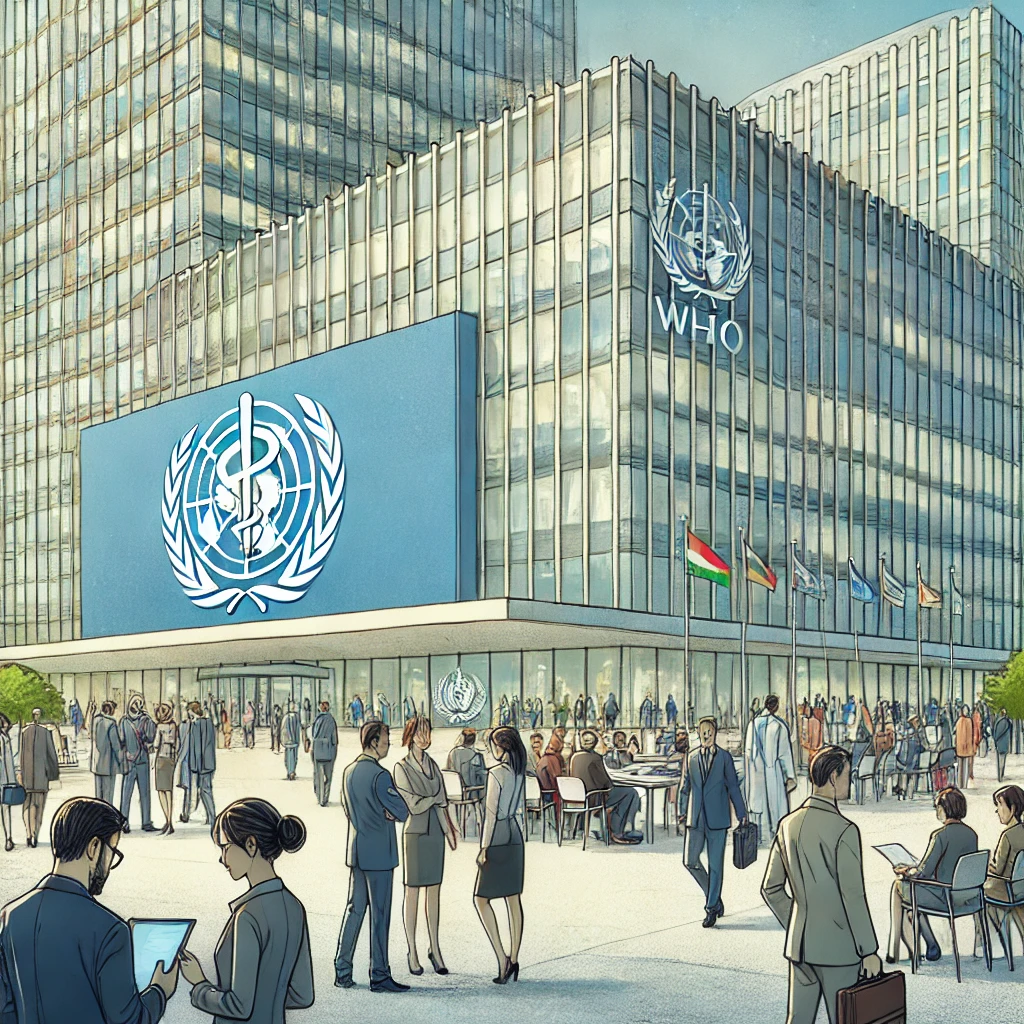The World Health Organization (WHO) is a vital entity within the United Nations, focusing on global health. Established in 1948 and headquartered in Geneva, Switzerland, WHO has 194 member states and multiple regional offices. It collaborates with member states, typically through health ministries, to provide leadership on health issues, set standards, and offer technical support. WHO’s efforts have significantly impacted global health, including the eradication of smallpox and the promotion of immunization.
- The WHO celebrates World Health Day annually on its formation day (7 April). The theme for 2020 was “Year of the Nurse and Midwife”.
- The member states of the WHO appoint delegates to the World Health Assembly, which is the supreme decision-making body. The World Health Assembly is attended by delegations from all Member States and determines the policies of the Organisation.

World Health Organization (WHO)
The World Health Organization (WHO) is a specialized agency of the United Nations dedicated to global health. Established on April 7, 1948, and headquartered in Geneva, Switzerland, WHO works with 194 member states. Its primary functions include providing leadership on global health matters, shaping research agendas, setting norms and standards, and offering technical support to countries. WHO also monitors and assesses health trends worldwide.
Objectives of WHO
WHO’s objectives are pivotal to global health improvement.
- To act as the directing and coordinating authority on international health work: WHO serves as the directing authority for international health, orchestrating global health initiatives and ensuring coordinated responses to health challenges.
- To establish and maintain effective collaboration with various organizations: WHO collaborates extensively with the UN, specialized agencies, and other organizations to enhance global health initiatives.
- To provide assistance to governments in strengthening health services: WHO aids governments by providing essential support to strengthen their health services.
- To promote cooperation among scientific and professional groups: WHO fosters scientific cooperation to advance global health, bridging gaps between professional groups.
Governance of WHO
WHO’s governance structure ensures effective decision-making and implementation.
- World Health Assembly (WHA): The WHA is WHO’s primary decision-making body, convening annually to set health agendas and make pivotal decisions.
- Functions of WHA: The WHA determines policies, supervises financial policies, and approves budgets, ensuring WHO’s strategic alignment and financial health.
- The Secretariat: Comprising the Director-General and technical staff, the Secretariat executes WHO’s mandates and supports member states in health initiatives.
- Membership and Associate Membership: UN members and certain territories can join WHO as members or associate members, fulfilling the criteria to participate in global health governance.
Contributions of WHO to the World
WHO’s contributions have been monumental in advancing global health.
- Technical support and disease outbreak monitoring: WHO provides critical technical support and monitors disease outbreaks, ensuring timely interventions.
- Coordination with other agencies and NGOs: WHO coordinates with UN agencies, NGOs, and other stakeholders to implement health initiatives effectively.
- Eradication of diseases (e.g., smallpox, tuberculosis): WHO has played a key role in eradicating diseases like smallpox and controlling tuberculosis.
- Immunization programs: WHO’s immunization efforts, particularly for childhood diseases, have significantly reduced global morbidity and mortality rates.
- Focus on infectious diseases and health services: WHO prioritizes tackling infectious diseases and improving health services, especially in developing nations.
- Response to emergencies (e.g., Congo crisis): WHO responds to health emergencies by mobilizing resources and health workers, as seen during the Congo crisis.
- Development of new treatments and health strategies: WHO is instrumental in developing new treatments and formulating health strategies to address emerging health challenges.
World Health Organisation and India
India and WHO share a robust collaborative relationship aimed at enhancing health outcomes.
- Smallpox eradication: India’s collaboration with WHO led to the successful eradication of smallpox in 1977, marking a significant public health victory.
- Polio eradication: India responded to the WHO’s Global Polio Eradication Initiative, achieving polio-free status in 2014 through extensive vaccination drives.
- Recent engagements: Recent interactions, including the COVID Virtual Summit, highlight ongoing WHO-India collaboration in addressing health challenges.
Role of WHO in World Health Concerns
WHO addresses a spectrum of global health concerns through targeted interventions.
- Air pollution and climate change: WHO combats air pollution and addresses its health impacts. Thereby, recognizing it as a major environmental health risk.
- Noncommunicable diseases: WHO implements strategies to tackle noncommunicable diseases like diabetes and cancer, which are the leading causes of death.
- Global influenza pandemic: WHO monitors and responds to potential influenza pandemics through a global surveillance network.
- Fragile and vulnerable settings: WHO provides health care in crisis-affected regions, ensuring access to essential services.
- Antimicrobial resistance: WHO’s global action plan addresses antimicrobial resistance, a significant threat to modern medicine.
- Ebola and high-threat pathogens: WHO responds to Ebola and other high-threat pathogens, mitigating their public health impact.
- Weak primary health care: Strengthening primary health care systems is a priority for WHO. It ensures comprehensive and accessible health services.
- Vaccine hesitancy: WHO addresses vaccine hesitancy through awareness campaigns to ensure high vaccination coverage.
- Dengue: WHO implements strategies to control and reduce dengue mortality, especially in endemic regions.
- HIV: WHO supports initiatives to combat HIV and provide treatment and preventive measures to affected populations.
- Covid-19: WHO has been pivotal in managing the COVID-19 pandemic through coordination, guidance, and support for countries.
- Monkeypox: WHO’s response to the Monkeypox outbreak underscores its role in addressing emerging global health emergencies.
WHO’s Organizational Challenges
WHO faces several organizational challenges impacting its effectiveness.
- Dependence on donor funds: Reliance on donor funds, primarily from wealthy countries and foundations, limits WHO’s flexibility and prioritization.
- Underfunded vital programs: Essential WHO programs often remain underfunded, affecting the organization’s ability to fulfill its mandate.
- Leadership role in global health: WHO’s leadership role is challenged by funding constraints and structural issues, impacting its global health influence.
- Performance in health crises: WHO’s performance during health crises, such as the Ebola epidemic, highlights challenges in funding, staffing, and bureaucracy.
Conclusion
The World Health Organization (WHO) stands as a pivotal institution in global health governance. It addresses critical health challenges and shapes international health policies. For UPSC aspirants, understanding WHO’s structure, objectives, and contributions is essential, as it not only highlights the complexities of global health but also underscores the importance of international cooperation in addressing public health crises. Thus, reflecting on WHO’s evolution and its ongoing reforms can inspire future policymakers to advocate for stronger, more transparent, and more inclusive global health systems.


